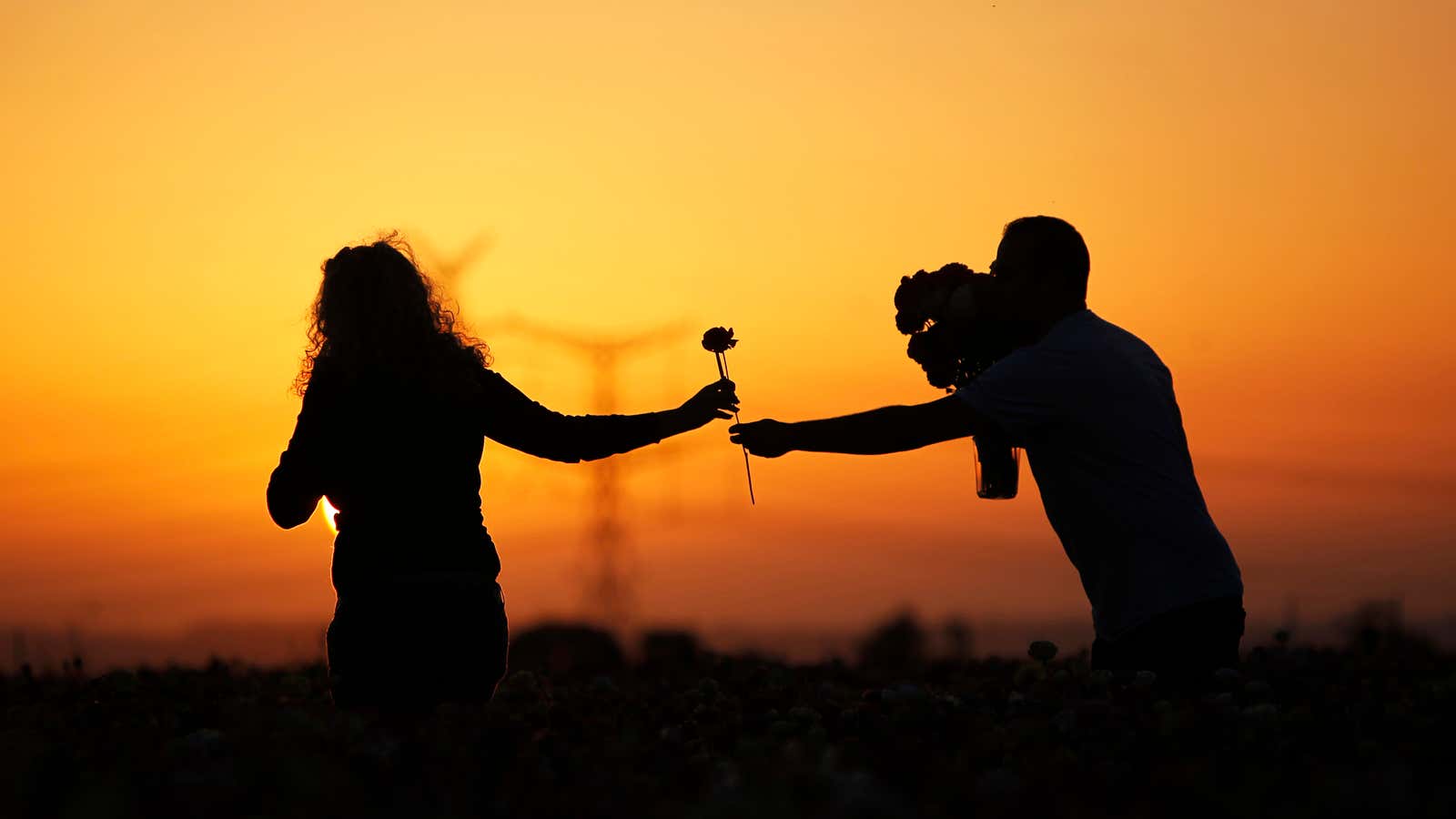It’s been about half a decade since dating apps arrived on the scene, and many are now joining what looks like a collective overhaul (paywall) of their services. Faced with an increasingly competitive app space, online dating dinosaurs like OkCupid have pivoted to a younger, tech-savvy audience with suggestive ad campaigns, while modern heavy hitters like Bumble and League are billing themselves as professional networking platforms that ostensibly allow one to climb the social ladder, and snag a date on the way. What’s more, most of them are branching into editorial content, with online verticals that feature original reporting, personal essays, and various other news functions.
Tinder, which has a reputation as a bonafide hookup app (paywall) for those seeking casual and in some cases adventurous sex, recently launched a digital publication it calls “Swipe Life.”
On Swipe Life, standard lifestyle sections like “travel,” “money,” and “style & beauty” are available, as well as long-form Tinder testimonials styled as personal essays that, as the New York Times writes (paywall), seek to “reinforce the idea that dating misadventures are cool, or at least exciting, invigorating and youthful.” According to the about page, it’s focused on sharing “the (often funny) ups and downs of your dating journey, and about what you eat, see, do, wear, and spend along the way.”
Hinge, which bills itself as a less frivolous alternative to Tinder, used a similar strategy with its 2017 “Let’s be real” campaign, in which it published awkward but sweet first-date stories on billboards across New York City.
While charming, the rom-com bad date narrative that dating apps are pushing is mostly a stretch considering the collective reality of most dating app misadventures, which are generally unfunny. On one end of the spectrum, dating online can be downright horrifying: Much has been written about the degree of harassment and abuse faced by women on dating apps, where men—emboldened by anonymity—say vile and hostile things, send unsolicited photos, and lob threats at women who reject or ignore them. The Instagram account @byefelipe has collected screenshot submissions of this kind of harassment from women who use various dating apps since 2014, posting them on a public Instagram and exposing the men:
The findings underline a 2017 Pew Research Center survey that revealed 21% of women ages 18 to 29 have experienced sexual harassment online, with 83% saying online harassment is a serious problem. This kind of harassment, meanwhile, is magnified for women and people of color, who also face racial discrimination on the platforms.
Race-based preferences in dating were highlighted back in 2014 in a blog post by OkCupid co-founder Christian Rudder, who noted that data collected from heterosexual users showed that most men on the site rated black women as less attractive than women of other races and ethnicities, while Asian men fell at the bottom of the preference list for women. That same year, Ari Curtis used the study as a starting point for her blog “Least Desirable,” which chronicled her experiences of dating as a minority with “stories of what it means to be a minority not in the abstract, but in the awkward, exhilarating, exhausting, devastating and occasionally amusing reality that is the pursuit of love.”
Earlier this year, Curtis shared with NPR some of the racial stereotyping she faced in real-life dates she set up via dating apps. She described meeting a white man on Tinder who brought the weight of damaging racial stereotypes to their date. “He was like, ‘Oh, so we have to bring the ‘hood out of you, bring the ghetto out of you!'” Curtis recounted. “It made me feel like I wasn’t enough, who I am wasn’t what he expected, and that he wanted me to be somebody else based on my race.”
Aziz Ansari gracefully parodied this and other aspects of dating-app culture in season two of Master of None, where the dozen or so women he takes out describe their experiences using dating apps, which span from the very dull to the truly vile. He also highlighted the other side of online dating that the slapstick narrative is attempting to dispel—that sometimes a bad date is just a wash. Not only is it boring and awkward, but it can be a total waste of time.
So, as dating apps undergo their identity crises, they will likely continue pressing on audiences the idea of bad dates as Adam Sandler–worthy catastrophes. It remains to be seen if users will be swept up in the campaign or if they’ll have the fortitude to see their own crappy dates for what they are—an occasionally amusing ordeal, but more often a prosaic waste of time.
